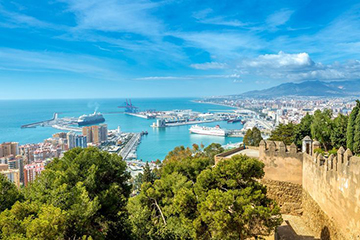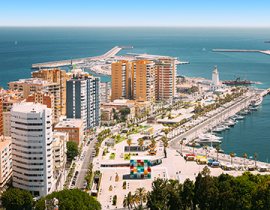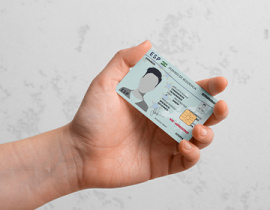- Home
- Blog
- Legislation
- Get a Residence Permit in Spain
Get a Residence Permit in Spain
On April 9, the Council of Ministers declared the cancellation of Spain's Golden Visa program. However, international buyers interested in purchasing property still have other options for obtaining residency, including the Non-Lucrative Visa or the Digital Nomad Visa.
Types of Residence Permits in Spain
In Spain, there are multiple kinds of residency permits, each designed for specific situations and goals.
The types of short-term or temporary residence permits in Spain:
.jpg) Schengen Visa (Type-C Visa): It serves as a travel permit that enables its holders to freely enter, move around, and depart from the Schengen Area, which comprises 26 European nations. People often use it for vacation, business purposes, or visits with family, and it generally allows stays of up to 90 days within a period of 180 days.
Schengen Visa (Type-C Visa): It serves as a travel permit that enables its holders to freely enter, move around, and depart from the Schengen Area, which comprises 26 European nations. People often use it for vacation, business purposes, or visits with family, and it generally allows stays of up to 90 days within a period of 180 days.
Seasonal or Temporary Work Visa: It permits individuals to work in a specific nation for a certain period, typically for seasonal or short-term jobs. The criteria for these visas vary from one country to another but generally involve a job offer from a company, evidence of skills or background, and occasionally, proof of accommodation and sufficient funds.
The types of long-term residency:
Non-Lucrative Residence Permit: The non-lucrative residence visa in Spain is designed for people who wish to live in Spain without working. It is often used by retirees, independent entrepreneurs, or people with sufficient financial resources to support their needs.
Digital Nomad Residence Permit: Spain attracts individuals who work remotely, freelancers, or business owners as the best digital nomad country. The permit enables one to reside and operate in that country for a long duration, typically between a few months to a year or beyond.
Work and Residence Permit: Authorities grant this permit to individuals who hold a job position or a work agreement in Spain, enabling them to legally live and work within the nation.
Student Residence Permit: It is for foreign nationals students attending an acknowledged educational establishment in Spain. It permits them to live in the nation throughout their academic period.
.jpg) Family Reunification Residence Permit: This is a type of visa for family members of Spanish citizens or legal residents who want to join them in Spain. It's also applicable to family members of EU citizens/ EEA citizens.
Family Reunification Residence Permit: This is a type of visa for family members of Spanish citizens or legal residents who want to join them in Spain. It's also applicable to family members of EU citizens/ EEA citizens.
EU Blue Card: This Spain residency card is for individuals from outside the EU/EEA who are highly skilled and have received a job offer in Spain that satisfies specific salary and qualification criteria.
Here are a few primary kinds of residency visas in Spain, but there could be more types or particular visas based on personal situations and the country's immigration rules. It's crucial to examine the necessary conditions and qualifications for each kind of visa before applying.
How to Get Residency in Spain?
Applying for a Spanish visa involves several procedures. These Spain residency requirements are:
1. Complete the Application Form
You can find the form on the Spanish immigration site online. Ensure to select the correct form based on your visa category. Complete the form, provide the necessary details, and sign where necessary.
2. Prepare the Documentation
- Collect all the required paperwork. The specific documents needed can differ based on the kind of residency permit you're applying for, but there are some common ones:
- A passport that is still valid for at least six months after your planned stay.
- A filled-out application form
- Photos that fit the size of a passport.
- Evidence that you have enough money to support yourself and any family members you're living with.
- You must have health insurance that Spain approves for use.
- A certificate showing that your criminal record is clean from your country of origin
- You will need to provide any documents required for the specific type of residency permit you are applying for (for example, a letter of employment, confirmation of enrollment, evidence of a relationship for family members to join, etc).
 3. Application
3. Application
Once you've filled out your application form, you're free to schedule a visa interview with the immigration office. You can schedule this interview by phone, through the Internet, or by visiting the Spanish embassy in your area. The method of scheduling may vary from one country to another, so it's advisable to explore the available options in your home country.
4. Attend the Interview
This is a crucial part of your application procedure. You must participate in a one-on-one meeting with the Spanish consulate at the nearest embassy. During this interview, the Spanish consulate will check all your documents for authenticity. Additionally, they will ask you specific questions about your move to a new country.
Once you've completed everything needed for the processes mentioned above, you can then look forward to getting your visa approved. It's crucial to begin your visa application early to prevent any delays that might happen.
Follow any updates in immigration regulations and processes, and think about getting advice from experts in immigration law.
The Benefits of Having a Residence Permit in Spain
Obtaining a residency visa in Spain offers advantages, making it a great choice for those living abroad and digital nomads. Here are some benefits:
Healthcare Accessibility: Individuals with a Spain residence permit in Spain can use the nation's public healthcare services, guaranteeing they get access to high-quality medical treatment as necessary.
.jpg) Education: The Spanish educational systems offer superior quality of instruction. Moreover, Spanish universities are celebrated for their academic superiority, allowing visa holders to pursue learning options at these institutions.
Education: The Spanish educational systems offer superior quality of instruction. Moreover, Spanish universities are celebrated for their academic superiority, allowing visa holders to pursue learning options at these institutions.
Travel within the Schengen Zone: Spain is in the Schengen Area, meaning that people holding a Spanish residency permit can move around other Schengen nations without having to apply for extra visas or permits.
Job Opportunities: A residency visa allows people to work legally in Spain or start their own companies, taking advantage of the nation's dynamic economy and business environment.
In general, getting a visa in Spain unlocks a variety of advantages, such as the ability to use medical services, receive education, and explore travel options across the Schengen Zone, improving the quality of life and professional experience.
All in all, residency in Spain permits individuals from outside the European Union to legally live in the nation for a significant duration. It grants access to medical services, schooling, and employment. Possessors have the freedom to move around within the Schengen Zone. To acquire one, one must fulfil certain criteria, including evidence of earnings, housing, and occasionally, the ability to speak the language.









